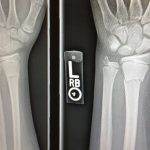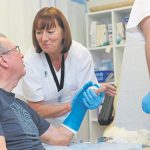It is currently estimated that over 3 million people in the UK have osteoporosis, a condition which affects the bones making them weaker, brittle and more susceptible to breakage.
Whilst osteoporosis is quite common, many people will suffer from the condition before it is diagnosed. This is because osteoporosis develops over time and there is often no indication that someone has developed the condition until they have a fracture.
Dr Pamela Mangat, rheumatology specialist at Highgate Private Hospital, answers some important questions on osteoporosis.
Question: How is osteoporosis caused and can anyone get it?
Dr Pamela Mangat says: As people get older, particularly after their mid-thirties, their bones are less able to repair so they begin to lose density and become weaker. Whilst this is a normal part of getting older, some people lose bone density more quickly than others, resulting in osteoporosis. There are other causes of osteoporosis, including a family history of sufferers or if someone suffers from an inflammatory condition like rheumatoid arthritis, like many of my patients.
Women are also more susceptible to developing osteoporosis after they go through the menopause because the body stops producing oestrogen, an important hormone in preventing the bone from becoming weak. You should talk to your doctor if you are concerned about being at risk of getting osteoporosis or if you think you may have it.
Question: Is there anything I can do to prevent myself from getting osteoporosis?
Dr Pamela Mangat says:
Whilst some people are more likely to get osteoporosis, like women, I always remind my patients that anyone can get osteoporosis, including men and there are some simple steps people can take to help protect their bones, keep them healthy and help prevent them from getting the condition.
The top four steps you can take to help protect your body from osteoporosis are:
1) Exercise: Build activity into your daily routine. It’s very important to keep active when you’re young and also as you get older. Exercise strengthens the bones and helps to keep the muscles strong, which supports the skeleton.
Whilst rigorous activity, like running or doing an aerobics class is good for you, if you are unable to do this more gentle activity is important too, like gardening or going for a walk – the added benefit of being outside in good weather is that vitamin D will be activated in your skin by the sun’s rays which is good for the bones.
2) Eat a healthy diet: Make sure you are eating a healthy, balanced diet rich in calcium and vitamin D, which your bones need to be strong. Calcium can be found in diary products, like skimmed milk, calcium-added soy milk and in leafy green vegetables, like kale and broccoli. Vitamin D can also be found in oily fish like salmon, mackerel and eggs so you should build all of these into a healthy, balanced diet.
3) Drink well: I try to remind my patients that what they drink is as important as what they eat for their health. Alcohol, tea, coffee and fizzy drinks all reduce the amount of calcium your body can absorb which weakens the bones. Try and limit the amount of these types of drinks you have – I try to encourage my patients to drink water wherever possible!
4) Stop smoking: Smoking increases your likelihood of getting osteoporosis as it weakens the bones, so it’s really important you stop smoking. There is help available if you’re finding quitting alone tough.
Question: Can osteoporosis be treated?
Dr Pamela Mangat says: Once you have been diagnosed with osteoporosis there will be treatment options available for you, for example medication which is used to strengthen the bones. However, not everyone with osteoporosis needs this, or even wants it, so your treatment plan will also be based on a number of different factors relevant to you, which your doctor will discuss with you.
Question: I have osteoporosis, should I be doing anything differently in my daily routine?
Dr Pamela Mangat says: People who have osteoporosis have more brittle bones which means that they are more likely to fracture. Fractures usually occur after a fall or in some cases, depending on the patient, a knock to the body. For this reason, it’s important to take care when you’re moving around at home – I recommend my patients remove any hazards in the home, like rugs or long cables which could make them trip up. When out and about, try and give yourself a little more time so you don’t have to rush across the road which could cause you to stumble. It’s also important to have regular sight and hearing tests so you are aware of what’s going on around you.
If you are concerned about whether you might have osteoporosis or are at risk of developing it, you should talk to a GP or a specialist.





